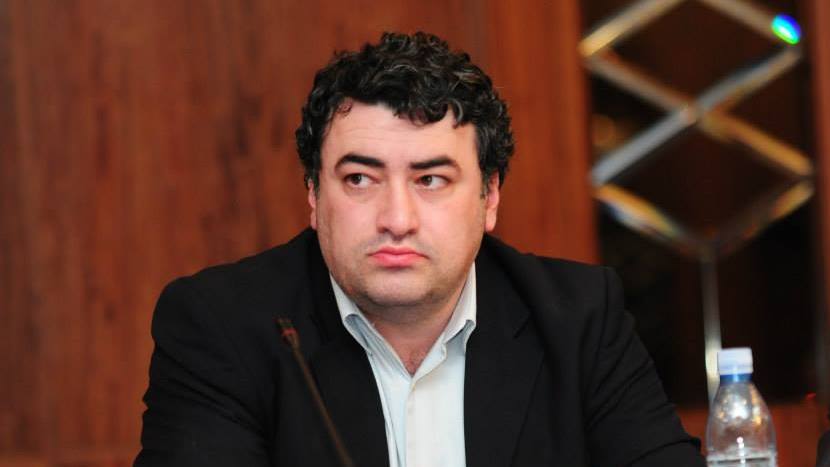Beka Mindiashvili: “Religious Minorities Shall Get Seized Chapels Back through Restitution”
February 8, 2016

Natia Gogolashvili
“The best solution will be if the State adopts the law and returns chapels seized during soviet period to religious minorities based on restitution. It is the best lawful way to resolve the ownership issue of places of worship,” head of the Tolerance Center under the auspices of the Public Defender’s Office Beka Mindiashvili told humanrights.ge.
-Recently, the State assigned places of worship to religious confessions under the status of user. The confessions evaluate the process positively but note that it would be better if they received the chapels under the status of ownership. How would you evaluate this process?
-Based on the Constitutional Agreement (Concordat) the Georgian Orthodox Church restituted the entire property which it owned before the soviet repressions. Of course other religious communities are in unequal conditions, who were also victimized by the soviet totalitarian system. Soviet regime either completely destroyed or seized their properties. Obviously we cannot positively evaluate assignment of the properties to religious groups only under the status of user. The State creates illusion that they take positive steps. The only correct step by the State will be if religious confessions receive the places of worship under ownership.
-One of the arguments of the State about ownership is that several organizations may belong to one religion community and the State will have to identify who can be the real owner of the property.
-Generally we do not have similar problems. Particularly when the dispute comes to the Armenian Church. Armenian Apostolic Church is united monolithic church, which does not have divisions like it is in the Catholic Church. Jewish community also has divisions but as far as I know they have no claims about properties. These, so-called disputes, may be very easily resolved after the state makes very clear statement about ownership rights of religious confessions. The best solution will be if the State adopts the law and restitutes the chapels to the religious minorities, which were seized during soviet regime. It is the best way to lawfully resolve ownership problem about places of worship. In doing so, the State will demonstrate kind will to return the seized properties to religious communities.
-Nowadays many places of worship became topics of dispute between Orthodox Church and religious minority groups. How do you see solution of the problem about disputed chapels?
-“Disputed” is conditional term; it shows as if there is some misunderstanding about the places of worship. However, the reality is completely different – Orthodox Church has misappropriated one part of those chapels. I mean, Catholic Churches. Catholic Churches in Batumi and Kutaisi are perfect examples. Their architecture does not leave any questions at all. The fate of the churches, which were seized from the Armenian Church, was also documented. Islamic nature of disputed buildings is also obvious but Orthodox Church still claims them. Both interior and exterior shows that they were mosques but Orthodox clergies claim those mosques were constructed with the stones of Orthodox Churches. “Dispute” is a sort of illusion with which the State and the Patriarchate want to drag out the process and maintain current situation. When we speak about similar disputes, it is nothing more than irresponsibility and alteration of history. In reality there is nothing to argue about. The reality is completely different – the Patriarchate has either misappropriated majority of chapels of religious minorities or tries to erase the history. For example, let’s speak about historical mosque in Mokhe village. The dispute about the mosque started after the Muslim community claimed it back in 2014. Before that the Patriarchate had no claims about it.
-Special commission was set up to study the case of the disputed building in Mokhe. Is similar solution of the case acceptable for you?
-Everybody knows what Ilia Chavchavadze said about commissions – if you wish not to do anything at all, you should set up a commission. They created this commission to study the case of Mokhe Mosque to do nothing, to freeze the so-called conflict and not to make any decision. In fact, the commission has been established for two years and they have not reached any result so far. Nothing was done except one thing that several meters away from the disputed building Orthodox parish finished construction of the church, that is sort of challenge in similar situation.
-However, Orthodox parish does not oppose Muslims to construct a new mosque in a neutral territory if they have similar necessity.
-The problem is that for the past 20 years the Orthodox Church has been censor and decision-maker for all other religions in Georgia. If representatives of concrete religious confessions wish to build a chapel, the State believes they have to ask permission from the Patriarchate first. In accordance to the law, the State has responsibility to ensure freedom of religion for all confessions. It is one of the basic fundaments of the Constitution of Georgia. Ownership and construction of the places of worship is one of the main components of freedom of religion. So, existing situation complicates culture of tolerance in Georgia and respect of the law on freedom of religion. Thus, it is necessary that the State respected the law.
The article was prepared in the frame of the project implemented with financial support of the Government of Canada. This article does not necessarily reflect the views of the donor.
Human Rights Center bears sole responsibility for the content of the article.
News
December 13, 2023
Ethnic minorities outside the peace dialogue
November 6, 2023
‘Peace’ agenda of political parties
Popular
Articles
February 13, 2024



